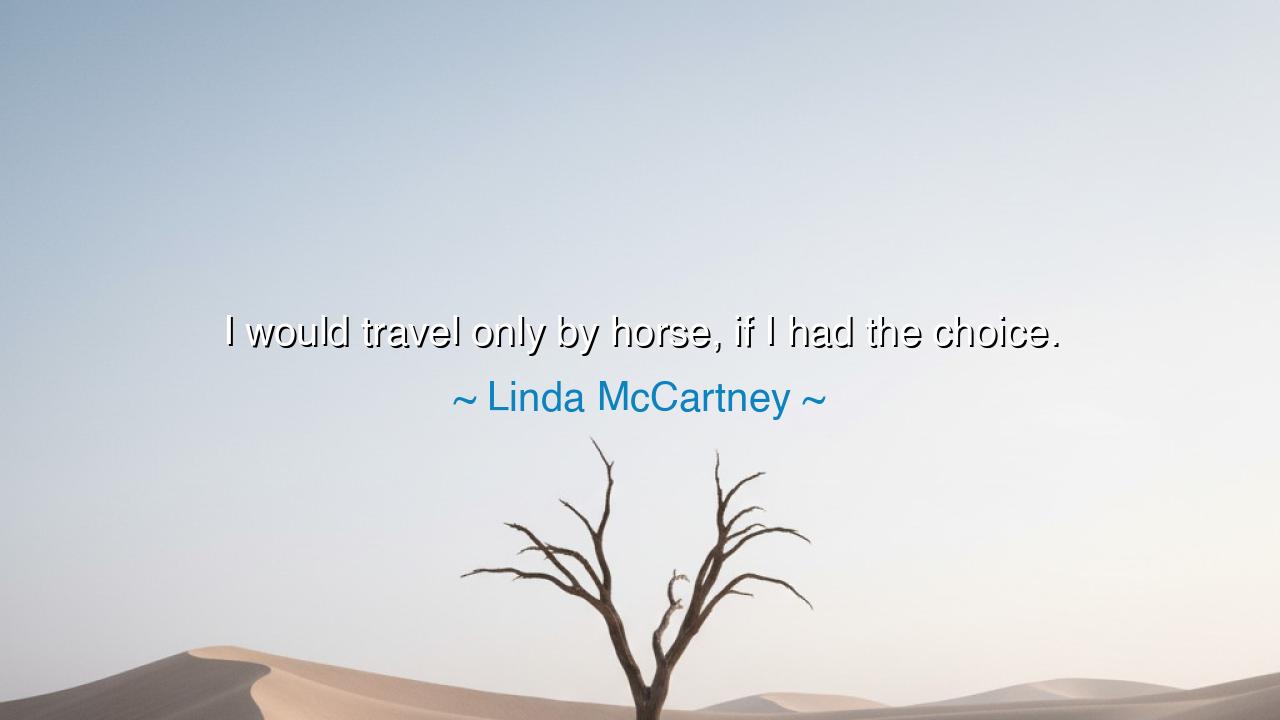
I would travel only by horse, if I had the choice.






Linda McCartney, with words simple yet profound, once declared: “I would travel only by horse, if I had the choice.” At first, these words seem quaint, a nostalgic yearning for an older time. Yet, when heard with the ears of wisdom, they reveal something far greater: a longing for slowness, for closeness to nature, for harmony with life’s rhythm rather than the restless speed of the modern world. In the horse, she finds not merely a means of travel, but a companion, a symbol of grace, freedom, and connection.
The horse has, since the dawn of civilization, been a partner of humankind. Upon its back, empires were built, messages were carried across mountains, and explorers reached horizons otherwise unreachable. To ride a horse is not to be carried by a machine, cold and indifferent, but to join yourself to a living creature. Each breath, each hoofbeat, becomes part of the journey. Linda’s words remind us that to move through the world in such a way is to remain rooted in the sacred bond between man, beast, and earth.
In her statement is also a lament for the loss of simplicity. Our age is one of jets and engines, of highways and speed. We move swiftly, yet often without awareness, seeing the world as a blur through windows. But the horse requires patience. It moves with dignity, neither rushing nor stalling, but carrying the rider at the pace of life itself. To travel by horse is to experience the road, to smell the earth, to feel the air, to live the journey rather than skip past it. Thus, her words call us back to presence, to savoring rather than consuming.
History confirms this truth. The Mongols, masters of the horse, conquered vast lands not only through force but through intimacy with their steeds. They lived with their horses as brothers, drinking their milk, riding them across deserts, resting beside them at night. Their strength as a people came not from machines, but from this sacred partnership. So too did knights of Europe bind their honor to their steeds, giving them names, treating them as extensions of their very souls. To say, “I would travel only by horse” is to call upon this ancient lineage, where travel was not separation from life, but immersion in it.
There is also something deeply symbolic in her preference. The horse is a creature of freedom, of wild spirit tamed but never broken. It carries mankind forward, but always with the reminder that we are not masters of the earth—we are companions upon it. To prefer the horse over all modern means of travel is to reject the coldness of steel and fuel, and to embrace relationship, humility, and reverence. Linda’s words are not only about travel; they are about how one wishes to move through life itself.
What lesson, then, do these words offer us? They teach us that speed is not always progress. They remind us that connection is more precious than efficiency, and that the way we move through the world shapes the soul as much as the destination we reach. To travel with a horse is to walk in companionship, in rhythm, in patience, and in respect for the living earth beneath us.
Practical counsel follows: slow down your journey. You may not ride a horse, but you can choose to walk more often, to take the slower road, to notice the trees, the sky, the people beside you. Choose companions over convenience, and awareness over haste. For in the end, the measure of life is not how fast we arrived, but how deeply we experienced the road.
Thus, Linda McCartney’s words shine like a quiet lantern: the horse, symbol of freedom and fidelity, offers us a reminder of how to live. Not as machines in endless haste, but as beings in harmony with nature, cherishing each step of the path. And if we can carry this spirit into our modern journeys, then no matter how we travel, we will move through the world with grace, dignity, and soul.






AAdministratorAdministrator
Welcome, honored guests. Please leave a comment, we will respond soon